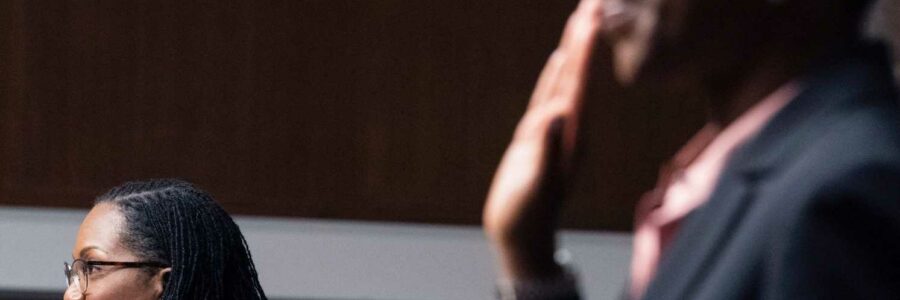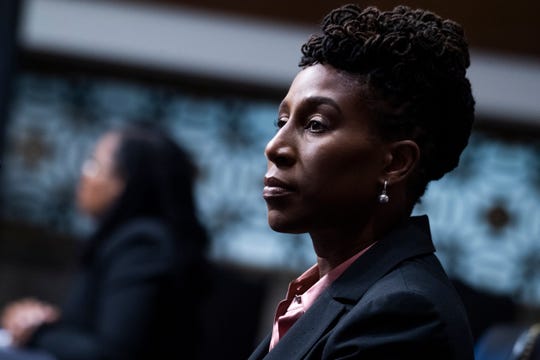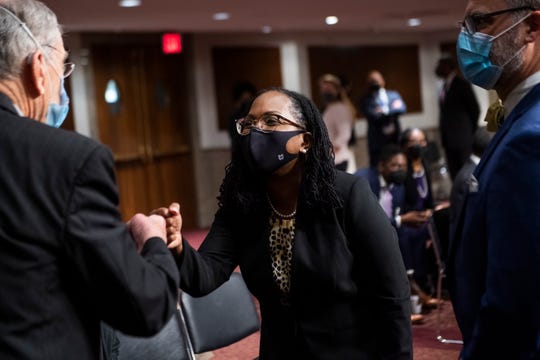
Biden poised to double the number of Black women appeals court judges
Candace Jackson-Akiwumi, nominated to be a judge on the U.S. Court of Appeals for the 7th Circuit, right, and Judge Ketanji Brown Jackson, nominated to the U.S. Court of for the District of Columbia Circuit, are sworn in during a Senate Judiciary Committee hearing, Wednesday, April 28, 2021, on Capitol Hill in Washington. (Photo: Tom Williams, AP)
WASHINGTON – With the Senate ramping up approval of his judicial nominees, President Joe Biden is poised to double the number of African American women serving on the nation’s federal appeals courts during his first few months in office.
While advocates for greater diversity say the share is still too small, Biden is on track to grow the number of Black female appellate judges to eight from four, ensuring that at least one Black woman is serving on more than half the nation’s circuit courts.
Biden’s highest-profile nominee, Judge Ketanji Brown Jackson, was confirmed Monday to a seat on the U.S. Court of Appeals for the District of Columbia Circuit – his first appellate judge cleared by the Senate. Three other Black women are in the pipeline for federal appeals courts – and all three appear to be on course for confirmation.
If those three are confirmed, and none of the current judges retire, it would represent the largest number of Black women serving on appeals courts in history.
“Black women bring a perspective to the bench that is sorely missing,” said Leslie Davis, CEO of the National Association of Minority & Women Owned Law Firms. “It’s an exciting time for the president to be thinking intentionally about the need for that voice.”
High court: Biden wants to put a Black woman on the Supreme Court for the first time
Jackson: Biden nominee poised for confirmation. Why it matters for the Supreme Court
Advocates such as Davis say the milestone is significant for several reasons. The four African American women on the appeals bench at the start of 2021 made up 2% of 179 appellate judges. By comparison, Black women make up 7% of the U.S. population.
Biden, meanwhile, has promised to name a Black woman to the Supreme Court for the first time in U.S. history if a seat opens during his term. The pledge has renewed attention on the relatively small pool of potential candidates currently sitting on the nation’s appellate bench, the place from which most nominees to the high court are plucked.
Many court observers believe Jackson, who made President Barack Obama’s shortlist for the Supreme Court in 2016, will be a top contender. Biden would get his chance if Associate Justice Stephen Breyer, 82, decides to retire before the midterm elections.
Jackson, 50, has served on the U.S. District Court for the District of Columbia since 2013. The Senate confirmed to the appeals court on a 53-44 vote.
As he read off the positions she previously held, Senate Majority Leader Chuck Schumer, D-N.Y., Monday praised Jackson as “the perfect person for the job,”
“She has all the qualities of a model jurist. She is brilliant, thoughtful collaborative, and dedicated to applying the law impartially,” the New York Democrat said on the Senate floor shortly before the vote on Jackson’s confirmation began. “For these qualities, she has earned the respect of both sides.”
Focus on diversity
Eunice Lee, a nominee for the U.S. Court of Appeals for the 2nd Circuit, on June 9, 2021. (Photo: Drew Angerer, Getty Images)
Biden has nominated 18 federal judges, including three who had already been confirmed before Jackson, and the administration is juggling 83 current court vacancies and another 30 that are coming down the pike in short order. The White House has touted diversity – racial and professional – every time it has announced a new slate of judicial candidates.
He has nominated the second judge from Puerto Rico to sit on the Boston-based U.S. Court of Appeals for the 1st Circuit, the first Native American federal judge in Washington State, the second Black woman to serve on the New York-based 2nd Circuit, the first Black woman to serve on the U.S. Court of Appeals for the Federal Circuit and the first Muslim American to serve as a federal judge, among others.
Latest nominees: Biden names new federal judges with an emphasis on diversity
Firsts: Biden nominees represent diverse professional backgrounds, identities
Biden picked Tiffany Cunningham, a Chicago attorney, to serve on the U.S. Court of Appeals for the Federal Circuit, a court with jurisdiction over international trade, government contracts, patents and other issues. Cunningham would be the first Black judge to serve on the Federal Circuit if confirmed.
The president named Candace Jackson-Akiwumi for a seat on the U.S. Court of Appeals for the 7th Circuit in April. Jackson-Akiwumi, approved by the Senate Judiciary Committee last month, would be the second Black woman on the Chicago-based court.
In May, he nominated Eunice Lee, a public defender, for the appeals court in New York.
“There has not been a Black woman confirmed to the circuit courts in almost 10 years,” said Fatima Goss Graves, president of the National Women’s Law Center. “And that shocking fact makes fulfilling President Biden’s promise to appoint the first Black woman to the Supreme Court especially important.”
But Biden’s emphasis on diversity has drawn criticism among some Republicans.
Candace Jackson-Akiwumi, nominated to the U.S. Court of Appeals for the Seventh Circuit, on April 28, 2021. (Photo: Pool, Getty Images)
“There’s a big difference between diversity and quotas,” said Sen. John Kennedy, R-La., a Senate Judiciary Committee member who opposed Jackson’s confirmation. “I think President Biden believes in quotas.
“If you pick someone on the basis of race or gender or sexuality or whatever immutable characteristic they’re using today, and you say ‘well I’m gonna pick a certain number of these,’ that’s immoral and unconstitutional,” Kennedy asserted.
The Constitution gives presidents wide latitude to pick judges, regardless of political party, and it’s not clear Biden has a set number of candidates of any race in mind. Instead, he has vowed to appoint nominees that reflect the diversity of the nation.
President Donald Trump had an enormous influence on federal courts, nominating more than 200 judges in four years. About 16% of his nominees were Black, Hispanic, Asian or otherwise not white, according to the Pew Research Center. That compares with 18% for President George W. Bush and 36% for Obama. About a quarter of Trump’s judicial nominees were women, a slightly higher share than other recent GOP presidents.
Those who support adding diversity to federal courts scoffed at the suggestion that Biden is picking candidates based solely on race – or because of “quotas.”
“When the conversation shifts in a weird way to ‘why aren’t we looking at qualifications?’ – that never happens when you’re talking about white males,” said Davis, with the association of minority-owned law firms. “I don’t get why that’s so hard to understand.”
Higher to highest
Judge Ketanji Brown Jackson, nominee to the U.S. Court of Appeals for the District of Columbia Circuit, greets ranking member Sen. Chuck Grassley, R-Iowa, before her Senate Judiciary Committee confirmation hearing on April 28, 2021, in Washington, D.C. (Photo: Pool, Getty Images)
Because she is widely considered to be on Biden’s short list for the Supreme Court, it is Jackson who has received the most attention – as well as the most criticism from Republicans – so far. Her unusual position has created tricky politics for the GOP.
On the one hand, Jackson was confirmed for her district court seat unanimously in 2013. Her D.C. Circuit confirmation hearing in April produced little in the way for fireworks. Outside groups that could have opposed her confirmation didn’t go out of their way to stop her.
But if Biden nominates her to the Supreme Court, Democrats are certain to call attention to any Republican who backs her now – just as Republicans have done when their nominees move up the judicial ladder.
A Republican Senate aide speaking on the condition of anonymity to discuss strategy said GOP lawmakers who support Jackson now aren’t boxing themselves in if Biden ultimately nominates her for the nation’s highest court because she’ll then have a record on the D.C. Circuit that will have to be scrutinized. Several conservatives, including the Senate aide, said that while Republicans don’t agree with Jackson’s ideology they view her as being in the mainstream, and amply qualified for the court of appeals.
Those opposing Jackson noted that she largely dodged a question during her April confirmation hearing about whether she supports the idea of a “living Constitution,” the notion that judges adapt their reading of the founding document to the times. Jackson sidestepped the query, saying she hadn’t had to confront it on the district court.
Sen. Chuck Grassley, R-Iowa, noted the exchange when he announced his opposition.
“They take an oath to enforce the Constitution and interpret the law, not make law,” Grassley told USA TODAY subsequently. “And it doesn’t matter who you are. That’s what your job is wherever you’re coming from. That’s what you gotta be.”
Jackson will become the fifth sitting female African American appellate judge, joining Judith Rogers, also on the D.C. Circuit; Ojetta Thompson, on the Boston-based 1st Circuit; Johnnie Rawlinson, on the San Francisco-based 9th Circuit; and Bernice Donald, who was confirmed for the Cincinnati-based 6th Circuit in 2011.
Advocates say having the additional voices on the appellate courts will matter.
“The background and experiences of judges shape their perspective and impact their decisions and case outcomes,” Goss Graves said. “Diverse representation also makes a difference in the public perception and trust of the court system.”
Source: Read Full Article



